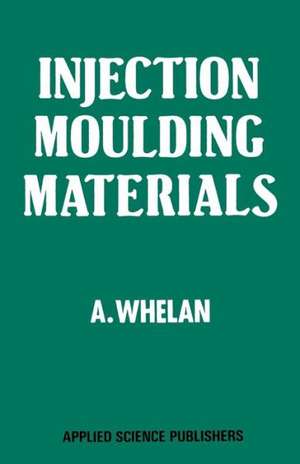Injection Moulding Materials
Autor A. Whelanen Limba Engleză Paperback – 9 feb 2012
Preț: 642.51 lei
Preț vechi: 755.88 lei
-15% Nou
Puncte Express: 964
Preț estimativ în valută:
122.95€ • 129.28$ • 101.59£
122.95€ • 129.28$ • 101.59£
Carte tipărită la comandă
Livrare economică 17 aprilie-01 mai
Preluare comenzi: 021 569.72.76
Specificații
ISBN-13: 9789400973602
ISBN-10: 9400973608
Pagini: 412
Ilustrații: 398 p.
Dimensiuni: 140 x 216 x 22 mm
Greutate: 0.48 kg
Ediția:Softcover reprint of the original 1st ed. 1982
Editura: SPRINGER NETHERLANDS
Colecția Springer
Locul publicării:Dordrecht, Netherlands
ISBN-10: 9400973608
Pagini: 412
Ilustrații: 398 p.
Dimensiuni: 140 x 216 x 22 mm
Greutate: 0.48 kg
Ediția:Softcover reprint of the original 1st ed. 1982
Editura: SPRINGER NETHERLANDS
Colecția Springer
Locul publicării:Dordrecht, Netherlands
Public țintă
ResearchCuprins
1 Moulding Materials and Materials Handling.- 1. Introduction.- 2. Delivery of plastics.- 3. In-plant materials handling.- 4. Material reclamation.- 5. Drying.- 6. Mixing and blending.- 7. Colouring systems.- 2 Moulding Machines and Processes.- 1. Types of machine.- 2. Ram machines.- 3. Two-stage preplasticising systems.- 4. In-line preplasticising systems.- 5. Other machine types.- 6. Injection mould types.- 7. Alternative moulding techniques.- 8. Reaction injection moulding.- 3 Machine Specifications.- 1. Facts included.- 2. The injection unit.- 3. The clamping unit.- 4. The hydraulic system.- 5. Control and setting.- 6. Optional extras.- 7. Safety.- 8. Machine purchase.- 4 Component Finishing and Decoration.- 1. Flash removal and buffing.- 2. Machining of plastics.- 3. Metallisation.- 4. Printing on mouldings.- 5. Painting.- 6. Welding.- 7. Mechanical joining.- 8. Adhesive bonding.- 5 Effect of Processing on Properties.- 1. Introduction.- 2. General effect of orientation and crystallinity on properties.- 3. Mould filling, packing and stress relieving.- 4. Detection of orientation and crystallinity.- 5. Effect of moulding conditions on properties.- 6. Effect of changing gate size and position.- 7. Experiment design in injection moulding.- 8. Moulding quality and unknown changes.- 6 Testing and Quality Control.- 1. The object of testing.- 2. Standardisation.- 3. Common short-term tests.- 4. Long-term testing.- 5. Injection moulding of plastics test specimens.- 6. Quality control and testing.- 7 Material Recommendations for Injection Moulding.- 1. Polystyrene.- 2. Styrene acrylonitrile.- 3. Toughened polystyrene.- 4. Acrylonitrile-butadiene styrene.- 5. Acrylic.- 6. Unplasticised polyvinyl chloride.- 7. Plasticised polyvinyl chloride.- 8. Cellulosics.- 9. Polycarbonate.- 10. Polyethersulphone.- 11. Polyphenylene oxide (modified).- 12. Low density polyethylene.- 13. High density polyethylene.- 14. Polypropylene.- 15. Polybutylene terephthalate.- 16. Nylon.- 17. Acetals.- 18. Polyvinylidene fluoride.- 19. Polyphenylene sulphide.- 20. Rubber reinforced polypropylene.- 21. Thermoplastic polyurethane.- 22. SBS block copolymers.- 23. Thermoplastic polyetherester.- 24. Fibre reinforced thermoplastics.- 25. Structural foam.- 26. Aminoplastics.- 27. Phenolics.- 28. Dough moulding compound.- 29. Elastomers.- Appendix I Euromap documents.- Appendix II Troubleshooting.










